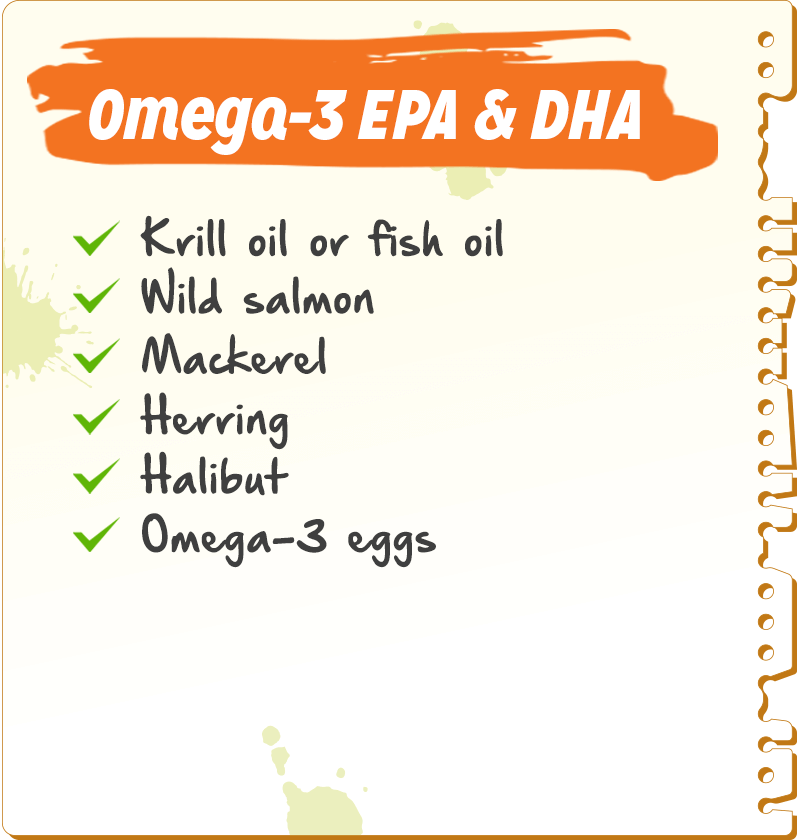Omega-3 EPA & DHA
Good for your heart and good for your brain, omega-3 fatty acids are one of the most widely used and beneficial supplements available today. The omega-3s you want to know about and make sure you get enough of are EPA and DHA. Together, they make up your Omega-3 Index, and the higher your Omega-3 Index, the more you’ll benefit from the power of omega-3.
Fast Fact: A steady intake of omega-3s from birth through old age is your best protection against chronic disease.
Why You Need Them: Decades of research demonstrate the benefits of omega-3s. Where omega-6 fatty acids encourage inflammation, which is very important when you are ill or injured, omega-3s dial back inflammation. The ideal ratio between omega-6 and omega-3 is 1:1. Unfortunately, omega-6 fats predominate the American diet by a 20:1 ratio (and by some counts far worse), leading to lots of inflammation throughout the body. Many scientists believe this profound omega-3-omega-6 imbalance is one of the major reasons for the high incidence of heart disease, hypertension, diabetes, obesity, premature aging, and some cancers today.
The good news is you can increase your consumption of EPA and DHA and reap the benefits of omega-3s and a high Omega-3 index. Those well-documented benefits include: decreased inflammation, reduced risk of cardiovascular disease, decreased risk of certain cancers, protection from depression, and better brain health. The American Heart Association, for instance, recommends people with coronary heart disease and those with high triglycerides supplement with EPA and DHA daily. One study found that people who supplemented with EPA and DHA daily for 3.5 years had a 25% lower risk of heart attack and a 45% lower risk of sudden death. Other studies link EPA supplementation to significant improvement in the symptoms of depression. In another study, elderly volunteers suffering from memory deficits saw significant improvement after taking DHA daily for 24 weeks, compared with controls. Yet another study found significant improvement in verbal fluency scores with daily DHA supplementation for four months compared with placebo.
DHA is crucial to the development of the unborn baby’s brain and eyes during pregnancy, and the FDA requires DHA be added to infant formula (breastfed infants rely on their mother’s DHA levels). DHA also affects children’s learning and behavior. Children up through age 2 need DHA for proper development and function of their central nervous system, and research shows babies born to moms who eat fish or take fish oil while pregnant score higher on intelligence, attention, and visual acuity assessments.

× ![]()
Best Food Sources: The best source of EPA and DHA is fatty, cold-water fish: salmon, mackerel, herring and halibut. Omega-3 enriched eggs are a good source of DHA, and they also contain substantially less of a certain inflammatory omega-6 that most people each too much of. You can also decrease your omega-6 by avoiding processed vegetable and seed oils, particularly corn, cottonseeds, soybean and sunflower oils, and the processed foods that contain them.
Supplement Suggestions: Antarctic krill oil is an eco-friendly, sustainable choice. Fish oil is also an excellent source. Avoid supplements that list only the amount of “omega-3s.” Opt instead for products with labels that list the specific amounts of EPA and DHA. Also, avoid supplements that contain omega-6 and omega-9 fatty acids. If your fish oil makes you burp, toss it and find a different product. To determine how much omega-3 you need, check your levels by registering to join our Omega-3 Index and Vitamin D study.
Need to Know: Omega-3 deficiency causes up to 96,000 preventable U.S. deaths per year, making it the 6th leading cause of death according to Harvard researchers.
Check out our food and supplement shopping tips.